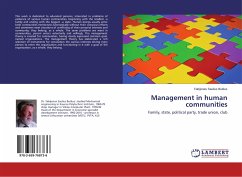With the astounding success of social networking systems such as Facebook, Bebo, LinkedIn, and MySpace, interest in social networks soared amongst researchers and pr- titioners. Organised groups of individuals can be of considerable value to ?rms, but a deeper understanding of the phenomenon is still lacking. User communities are social networks of individuals who group together with the purpose of exchanging ideas, insights and experiences with each other. Although the concept of leveraging user communities for innovation management is not new, most of the literature has assumed the ready existence of user communities and has concentrated on examining how ?rms can cooperate with them. Research on the emergence and persistence of user communities has mostly been neglected. Celine Schulz attempts to ?ll this gap by focussing on why user communities exist, what their goals are and how they function. In her dissertation, Celine Schulz undertakes a study of individuals in user communities of the software ?rm Computer Associates (CA). Using an online survey, a unique data set of users in 161 di?erent CA user groups was assembled. Thisdissertationconsistsofthreeempiricalstudiesbasedonthisdataset. The ?rst two studies analyse why individuals communicate with other members in their user communities, that is why they are willing to share information with each other and how they bene?t from the interaction with their user communities. The third study examines how user communities can be leveraged for ?rms' innovation processes, by speci?cally investigating the individual- and group-speci?c attributes of customer collaborators from user communities.
Bitte wählen Sie Ihr Anliegen aus.
Rechnungen
Retourenschein anfordern
Bestellstatus
Storno








